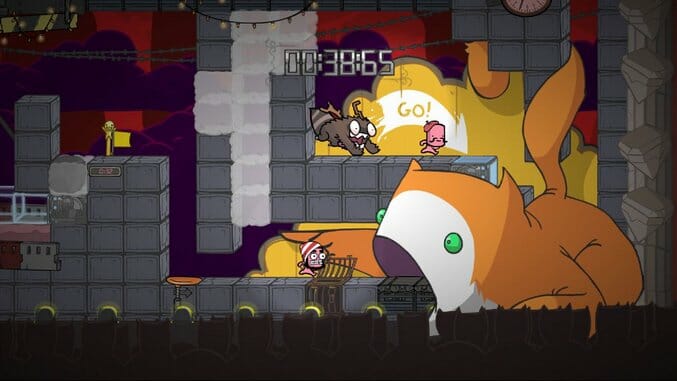
Every day we’re battling. You can trace almost every videogame back to Combat, that monochromatic duel between blocky tanks that had us flipping our RF switches thirty years ago. As we angled that big black stick and thumbed the orange button in hopes of hitting that other tank with a tiny blip, we were exploring the true nature of human interaction. Every meeting with a coworker, every glance at a stranger on a morning commute, every repetitive conversation with a spouse over another reheated dinner represents the purest form of competition. Combat, either with other players or with the game’s rules or mechanics, is a vital component to every game because it is a vital component to life. It is life. Every day we’re battling.
Or something? I mean, I’m just talking about Battleblock Theater. It’s a game? With, like, buttons, and stuff?
Okay, there are no grand metaphors for existence here, especially none as embarrassing or solipsistic as that slop above. Battleblock Theater is about as pure as games get these days. You do stuff, and it’s fun, so you keep doing it. Imagine if Super Meat Boy eased up just a bit with all that dying, and if its postage stamp-sized level design spread out over the entire postcard. Now imagine if there was also a fast-talking narrator who sounds a bit like Eddie Cantor and who never takes a damn breather like once ever. Now try, if you can, and this is the single most difficult part of this tortured chain of suppositions, try, if you can, to imagine that the narrator’s non-stop patter is almost always legitimately and genuinely funny (not like Louis C.K. funny but like Animaniacs funny, ie kinda quaint and dorky but still clever and quick enough to stay in the black, laff-wise). Imagineer all of that and you just might have a solid mental snap of what Battleblock has to offer.
You jump. On blocks. With a tiny little cartoon guy with customizable skin color and head shape. Sometimes the blocks disappear at a set interval. Sometimes the blocks explode shortly after you touch them, returning shortly thereafter. Sometimes there are spikes on the blocks, or saw blades, or mean cats that kill. Occasionally a furry pink critter acts like a movable block that you can stand on and control. You jump and run on these blocks while scooping up green gems that both unlock the level’s exit and also can be used to buy freedom for your character’s imprisoned friends. There’s more to collect than gems, too: A ball of string is a super bonus and an occasional golden top hat is a super duper secret bonus. Run, jump, grab those things, hit the exit, and then repeat several dozen more times until there’s nothing left to repeat. That’s Battleblock Theater, but that barebones description is also Battleblock Theater with everything that makes it special and soulful stripped away.
Battleblock tips its hat towards a slim smattering of classic game genres, but it’s not nostalgia or even technical proficiency that makes this game special. It shares something else with Super Meat Boy, and it’s perhaps the most elusive and precious of all commodities in the world of games: personality. The Behemoth’s typically wonderful art design is a large part of that, with a cutesy cartoon aesthetic that sticks to the company’s house style but remains visually distinct from Castle Crashers or Alien Hominid. From the adorably stoic cat prison guards, to the fanciful faces your character can adopt, to that wonderful narration (which only occasionally strays into bad poop-joke territory), this is one of the most immediately and thoroughly likable games this side of a Nintendo box.
It also goes well with people. The story mode is entirely co-operable and the retinue of arena diversions adds a competitive edge to a game whose pace is already rather manic. That you can so easily transition from battling machine to man without compromising your experience speaks to the elegance of the game’s design.
If Battleblock was just a mechanically and conceptually sound expansion on game ideas we’ve blasted through since jungle gym days, it’d be one of a dozen interchangeable indie nostalgia fests. Yes, its puzzles are vexing, their solutions satisfying, the fingerwork precise and the difficulty curve a respectful and gentle slope. Just as important, though, is that Battleblock nails an irreverent and anarchic spirit that few games pull off well. The game’s got charm, and that’s worth battling for.
Battleblock Theater was developed by The Behemoth and published by Microsoft. It is available for the Xbox 360 through the Xbox Live Arcade.
Garrett Martin edits Paste’s games section and reviews games for the Boston Herald. He’s contributed to just like tons of outlets and exists on Twitter @grmartin.
